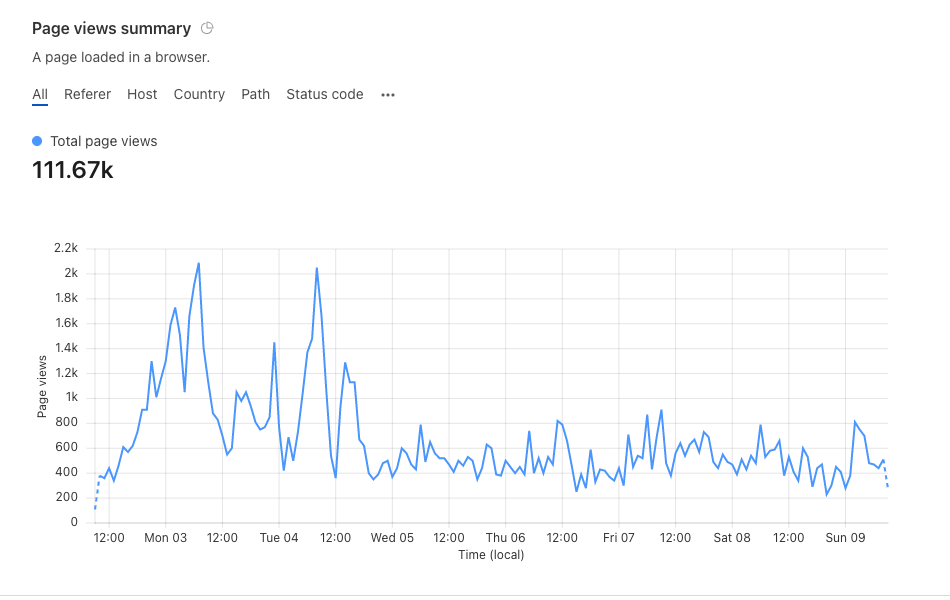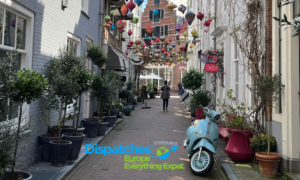(Editor’s note: Google doesn’t like us, and we don’t know why. If they don’t like you and your blog or website, we’d like to hear from you.)
For six years, Dispatches Europe has published solid content from our staffers and contributors across the continent, including a fair amount of primary-source reporting considering we’re a startup. We cover the expat lifestyle, but also tech because so many expats pouring into Europe are highly skilled internationals.
With our first pure-play digital media company, traffic took off early and we built to almost 1 million page views per month during the three years before our exit, 2010 to 2013. Pretty good traffic considering it was a small market.
With Dispatches, we feel like Sisyphus, pushing that boulder up the hill, only to see it roll back down again. Why? Because Google does something now that it didn’t do in 2013 – change its PageRank algorithm every five minutes.
One big difference is, our first company was a news site and we had a lot of big scoops, with other media linking to our posts, boosting our page rank.
The percentage of return visitors was off the charts, yet we never stopped attracting new users.
No ‘news’ is bad news
Dispatches is different … it’s a lifestyle website and we don’t break big stories. Most of our content is evergreen information about visas, tech, best countries for expats, expat travels or whatever. Still, in the early days, Dispatches had solid traffic with huge peaks including one Brexit post, “Dear Brits,” by early contributor Nina Avramovič Trninič that got hundreds of thousands of views over a few days.
As a brand new expat lifestyle website founded in 2016, we averaged reasonable traffic. Though we’ve never been able to equal the incredible growth of our first media company, Insider Louisville (now Louisville Future), which was a far smaller market in a small southern American city.
Still, when we started Dispatches in 2016, traffic doubled in one year. Which is okay, but not great. Traffic usually increases at the fastest rate in the first years. Dispatches kind of plateaued until 2020, then traffic started to increase rapidly to about 10,000 page views per day. Again, okay, but not great considering our potential audience is in excess of 30 million people. Until Wednesday, 19 August 2020, we averaged about four pages per visit, very good in the digital world.
Then this happened:

From 19 August to 22 August 2020, our traffic dropped from an average about 10,000 page views per day to about 2,000, an 80-percent decrease over four days! Pages per visit dropped to 1.31 – where it stands today – from more than 4. And when I say 1.31, I mean 1.31, not 1.32 or 1.30.
What are the odds, right?
Our bounce rate jumped to more than 80 percent from 20 percent.
Why?
Google.
It just happened again earlier this month:

It’s always about money
Google changes its algorithm regularly, supposedly to give users a better experience. In other words, so users don’t get fed cheesy clickbait sites when they search for, say, info about healthcare. We get that. But in the end, it’s always about the money, and Google is starting to feel the heat from Amazon and other search engines.
In the process, sites like ours that get most of our traffic through organic search and direct traffic, Google referrals get crushed. The top-ranked websites generate the most money for Google through AdSense and video advertising, which represents about 80 percent of Google’s $180 billion in top-line 2021 revenue from search ads.
We ain’t on that list because we don’t sell anything – goods or services – and we don’t have any maps to search for the nearest KFC. We don’t do in-house video.
Now, if you’re looking for information on 1 euro houses in Italy, our post comes up on the first page of a Google search. But it used to come up among the first three listings. Part of it is, our post has only one primary-source interview, whereas similar Independent and CNN posts ranked above us have several. I get that. We’re not CNN. We can’t (yet) send people around the world doing interviews.
But for a small, targeted site, we have a lot of posts with primary source reporting. Recently, we had Sarah Nagaty’s interview with Paulo Ferreira dos Santos, founder of the startup Pick in Porto, Portugal. Alice Verberne in France just interviewed a famed mycologist for her post about hunting mushrooms. We have a regular Eindhoven Business Briefing that has both aggregated and primary source information along with interviews and coverage of live events.
We should have better traffic.
Are we doing everything right? No … in fact, we’ve done an SEO audit and are making changes. But we follow Google guidelines, and of course Google never gives you feedback telling you why your traffic just dropped 80 percent. Nor can you appeal what would be a death sentence if we were depending on advertising revenue.
Full disclosure – we’ve never dedicated a lot of resources to the website because it doesn’t make any money. All our revenue comes from ancillary communications businesses. As I’ve written so many times before, Dispatches Europe is simply our billboard on the side of the Internet.
But someday we will want to monetize it, and we will dedicate real resources to adding video, podcasts and even streaming instructional videos. Still, we ask ourselves, “If we do all that – invest the serious capital needed to build our traffic only to watch the boulder roll back down the hill when Google changes its search algorithm – what’s the point?”
We know we’re not the only website dealing with this. While researching what the hell happened to our traffic, I found similar accounts. The consensus is, the Google algorithm itself is having a difficult time understanding what some websites do, and that’s resulting in wild traffic swings.
But the larger issue is, should Google have the power to arbitrarily and capriciously suppress legitimate independent media, especially considering its bots aren’t doing a great job of differentiating good from bad.
Even when you devote resources to recruiting great contributors who create great content, Google can – intentionally or not – keep you from reaching an audience.
What do you think?
Tell us at: [email protected]
And tell us if we can use your quotes.
Co-CEO of Dispatches Europe. A former military reporter, I'm a serial expat who has lived in France, Turkey, Germany and the Netherlands.















